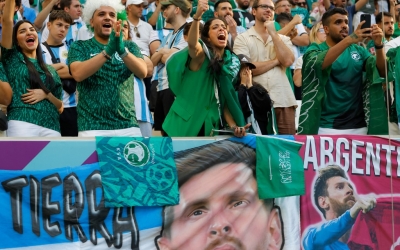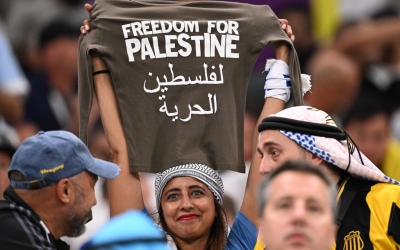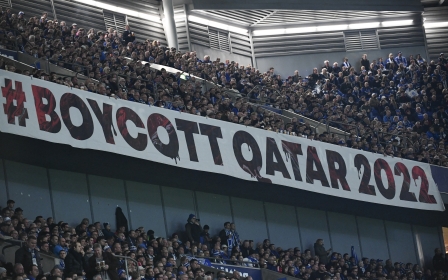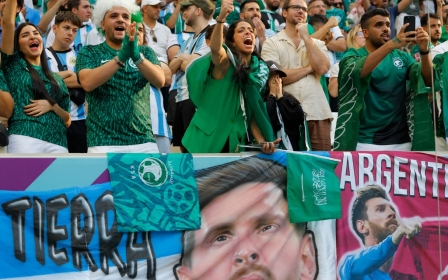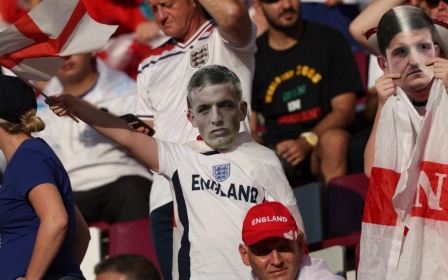Qatar World Cup: Has politicisation undermined the beautiful game?

There is no denying that sports and politics have become inseparable in recent times.
This intersectionality has largely overshadowed the brilliant performances, upsets, and sporting dramas the world is witnessing at the Fifa World Cup 2022 in Qatar.
Politicisation of sports is not a new phenomenon. During the Cold War, the USA and the then USSR boycotted and counter-boycotted the 1980 Olympics in Moscow and the 1984 Olympics in Los Angeles, respectively.
In cricket, various Indian and Pakistani prime ministers have watched cricket matches together in their paths towards improving diplomatic ties between the rival nations, and there was a long-term sporting boycott of South Africa during the apartheid years.
Russia was banned from the 2022 World Cup due its invasion of Ukraine.
New MEE newsletter: Jerusalem Dispatch
Sign up to get the latest insights and analysis on Israel-Palestine, alongside Turkey Unpacked and other MEE newsletters
Taking a back seat
The coverage of the Qatar World Cup by the western media has taken this mixture to a new level where the game of football itself has taken a back seat while the politics of workers' rights and LGBTQ issues have become the main focal points of the media narrative.
Ever since Fifa declared in 2010 that Qatar would host the 2022 World Cup, the western media and football pundits have been campaigning relentlessly against the decision.
If we look at the history of the World Cup, we can see that between 1930 and 1990, every World Cup was held in either Latin America or Europe - the two continental powerhouses of football.
Realising that the sport should be diversified, Fifa began to expand the hosting rights resulting in the World Cup being held in the USA in 1994, Japan and South Korea in 2002, and South Africa in 2010.
The decision to award Qatar is a continuation of that expansion, bringing the Middle East and the Islamic world within the umbrella of football. The western media never accepted this decision and raised bribery allegations against Fifa and Qatar, which were never proven.
After the failure of the corruption story, they started complaining against having the World Cup in a country with high summer temperatures, and when the decision was made to host the event in winter, they argued that it would affect the European football calendar.
When all these efforts went in vain, they brought up the sensitive issues of migrant workers’ human rights and anti-LGBTQ laws in Qatar. Even now, almost four weeks into the event, the relentless media campaign against Qatar shows no sign of abating.
It is true that there have been concerns on migrant workers’ human rights in Qatar, and thanks to the World Cup, many of these problems have been addressed by the Qatari authorities
On LGBTQ matters, it was difficult for the host country to satisfy the West as homosexuality is officially banned there, like in many other countries around the world. Qatari officials reassured the world that LGBTQ people were welcome and only warned against public display of affection, which also applies to heterosexual relationships.
Yet the war of words continued with the Fifa president asking the West to stop giving moral lessons due to their own dark past, followed by Fifa banning team captains from wearing "one love" armbands.
The politics of protest
While both these controversies had nothing to do with Qatar as the host, the West retaliated by continuing to highlight political issues, sometimes at the expense of the sport itself.
This can be illustrated by the prime time BBC TV News coverage of two of the biggest upsets in the World Cup over two consecutive days. On 22 November, the report of Saudi Arabia's victory against Argentina was given far less prominence than one woman wearing a rainbow hat being denied entry into the stadium.
The very next day, Japan's upset against Germany was overshadowed by the report on the German football team's gesture of covering their mouths in their team photo.
It seems that over-emphasis on politics affected the on-field performance of some teams. As former Arsenal coach Arsene Wenger observed, the teams that focused more on the competition of the sport outperformed those that were more concerned with "political demonstratons". Germany, a four-time title winner and one of the fiercest critics of Qatar, failed to reach the knockout stage of the tournament.
The political debates surrounding Qatar's World Cup have gone far beyond human rights and LGBTQ issues. Heated debates between "woke" and "anti-woke", left and right, West and East, etc, have spread like wildfire in print, electronic and social media platforms.
The West’s persistent criticism of Qatar and apparent hypocrisy on human rights issues have led some commentators to claim that orientalism and Islamophobia are at the root of this negative coverage.
On the other hand, some argue that sports are being used to cover up a lot of injustices in the world, and the term "sportswashing" is now trending in the British media. BBC football presenter Gary Lineker admitted that the BBC was complicit in sportswashing during the Russia World Cup in 2018.
Finding unity in sport
What people forget in all these narratives, counter-narratives, and debates is that football is a beautiful game that transcends race, ethnicity, religion, and nationality.
We must remember that politics should not supersede sports that have the power to bring people together
It is one of the few games that has reached every corner of the globe, and when the World Cup takes place every four years, the whole world comes together as one global community enjoying the skills and drama in display.
The ecstasy in victory and despair in defeat demonstrated by players and spectators alike during and after a 90/120-minute emotional rollercoaster of a football game is unparalleled, and no political point-scoring can surpass human manifestation of love for the game.
No one talks about Pele’s political views, and even though most followers of modern football have not seen Pele play, he is only remembered as one of the best players to have played the game. Maradona as a human being had many failings, but he is universally loved as a footballing genius and the scorer of arguably the best ever goal in World Cup history.
The western obsession with their own views of the world as morally superior make them oblivious that the rest of the world is less bothered about the politics off the field and is enjoying one of the best World Cups in history in which major footballing nations like Brazil, Argentina, Spain, Belgium, Germany, France, and Portugal all lost to less fancied teams, with Brazil, Germany,
On the other hand, Morocco's journey to the semi-final, the first African and Arab team to achieve this feat, is nothing but a fairytale.
Perhaps football is losing to politics in Europe, but it is the on-field football that has captured the imagination of billions of sports lovers around the world. The participating nations in the finals may be only 32 but football lovers of every nation are staying glued to television sacrificing their sleep and even work to witness the greatest show on earth.
One such example is the passionate support for Argentina in Bangladesh that has even been acknowledged by the Argentine coach. Bangladesh may be located thousands of miles away from Argentina, but the love many people have for Argentina and Messi is a perfect example of football transcending geographic and national boundaries.
It is true that we cannot separate sports from politics completely, but at the same time, we must remember that politics should not supersede sports that have the power to bring people together. In the ever-polarised world we now live in, let us at least cling on to things that can unite us, even if it is for a brief period.
The atmosphere in Qatar during the World Cup, despite constant negative coverage in Western media, is nothing but celebratory where people are enjoying the culture and hospitality of the host nation and are having friendly interactions with football lovers from around the world.
Let us leave aside politics for the time being and enjoy the spectacle as the tournament now gets into its final stages.
The views expressed in this article belong to the author and do not necessarily reflect the editorial policy of Middle East Eye.
Middle East Eye delivers independent and unrivalled coverage and analysis of the Middle East, North Africa and beyond. To learn more about republishing this content and the associated fees, please fill out this form. More about MEE can be found here.



